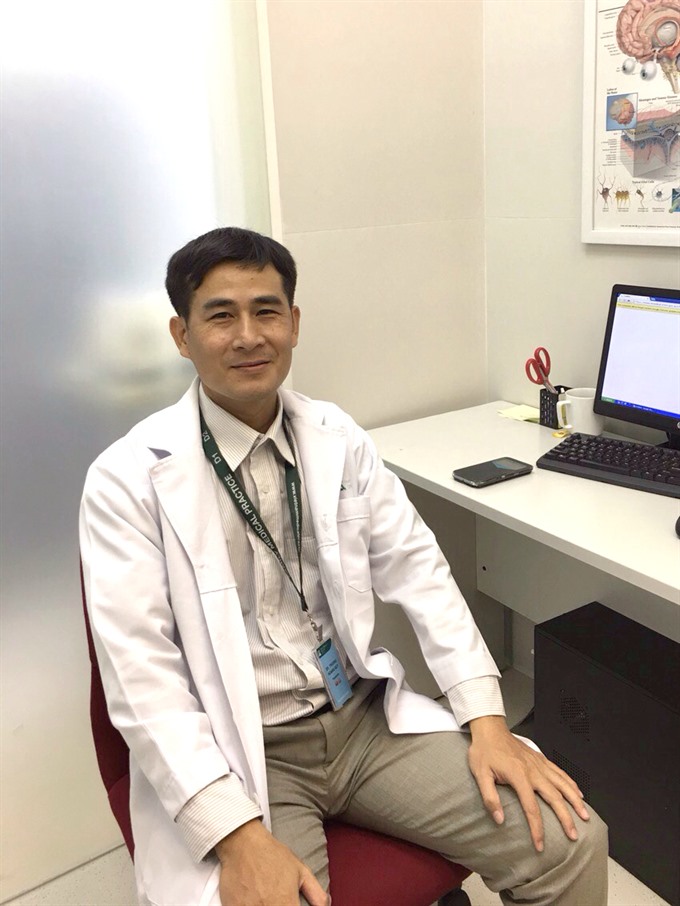 Life & Style
Life & Style

Acute Respiratory Tract Infection (ARTI) is the most common disease among the general population, especially among children younger than 5. According to the US Centres for Disease Control (CDC), each child has six to eight episodes of respiratory infection annually, on average.
 |
| Dr Trương Hoàng Quý — Photo courtesy of Family Medical Practice. |
Dr Trương Hoàng Quý *
Acute Respiratory Tract Infection (ARTI) is the most common disease among the general population, especially among children younger than five. According to the US Centres for Disease Control (CDC), each child has six to eight episodes of respiratory infection annually, on average.
In Việt Nam, ARTI rates in cities are higher than in rural areas, likely the result of pollution. Although ARTI may occur any time of year, in Việt Nam the peak is in the fall or winter seasons.
RTIs are the leading cause of missed days of school or work. Furthermore, RTIs can also result in illness and mortality in children under five. Data from the World Health Organisation (WHO) shows that about 2 million children under five die of pneumonia every year, most in developing countries.
Most common in Việt Nam
Respiratory infections affect both the upper and lower respiratory tract. In Việt Nam, the most common upper respiratory tract infections are rhinitis (common cold), sinusitis, ear infections, acute pharyngitis or tonsillopharyngitis and epiglottitis. The most common lower respiratory infections are pneumonia and bronchiolitis
Main causes
In term of the etiology, the majority of upper respiratory infections are viral. The rhinoviruses account for 25-30 per cent, and respiratory syncytial virus (RSVs), parainfluenza and influenza, human metapneumo virus and adenovirus for 35 per cent. The causes of lower respiratory infections are viruses such as RSV and influenza, but they are also caused by bacteria, such as Streptococus pneumoniae, Haemophilus influenzae or staphylococus aureus.
How to treat
Most upper respiratory infections can be treated at home, leading to recovery within one week or 10 days. However, about 25 per cent can lead to pneumonia and need to be treated in hospital.
Home care:
- Breastfeeding or solid feeding can be continued as usual;
- Drinking lots of water is encouraged;
- Cough medication should be used as needed.
When to see your doctor:
- Your child has difficulty breathing;
- Your child refuses to breast or bottle feed or cannot drink water;
- Your child has convulsions, is lethargic or irritable;
- Your child has a high fever that cannot be controlled;
- Your child is wheezing or coughing, bringing up yellow, green or grey mucus
- Your child is under 2 months old with a high fever or hypothermia.
How to avoid
- Hygiene: hand-washing is a mainstay for reducing the risk of contracting a URTI. All sick children and other people in the house must wash their hands frequently.
- Do not allow children to share drinks, cutlery or toys with others and ensure these items are cleaned after use.
- Encourage your child to cough or sneeze into tissue and throw it away immediately.
- Minimise contact with newborn babies or other sick children in the family.
- Children should stay home until the fever is gone and they feel well enough to go to school or child care.
- Immunisation: The 5 in 1 vaccine is very important in preventing common diseases in children such as Hib, pertussis or diphtheria. Conjugate pneumococcal vaccines (7 PCV and 9 PCV) are now available in Việt Nam, providing significant efficacy against invasive pneumococcal disease. For children over 6 months of age, influenza is also a good vaccine that can help avoid flu.
- Good nutrition such as exclusive breastfeeding for children under 4 months
- Avoidance of smoke and pollution.
- Keep clean house and furniture, as well as doors, windows, blankets, pillow, toys.
Common mistakes
- A common mistake Vietnamese parents make is using antibiotics bought at pharmacies, sometimes without knowing its name and without a doctor’s description. Some parents re-use old medication prescribed previously, thinking that when a child has a cough and fever, he has the same disease as last time.
- In Việt Nam, different generations live together in households and older relatives medicate children based on their own experience, without seeing a doctor. Some families use traditional medicines for children that can result in side effects, such as diarrhea. Some symptoms even deteriorate after using traditional medication.
- Fever is a good symptom of the body’s right against disease. However, some parents worry about that symptom and overdose their children on antipyresis medication.
In conclusion: the most common cause of respiratory infections are viruses. They usually require symptomatic home treatment, such as increasing fluid intake and taking medication for fever. Parents need to observe their child carefully and know the red flags that should send them to a doctor. — Family Medical Practice HCM City
* Dr Trương Hoàng Quý joined FMP Vietnam’s medical staff in 2014, after receiving his masters degree in Public Health Nutrition from Queensland University of Technology, Australia. As the only Vietnamese doctor in FMP HCMC’s Pediatric Team, he understands the Vietnamese culture and the needs of Vietnamese patients.
For more advice on medical topics, visit FMP Hanoi at 298 Kim Mã Street, Ba Đình. Tel: (04) 3843 0748. E: hanoi@vietnammedicalpractice.com. FMP’s downtown Hồ Chí Minh City clinics are located at Diamond Plaza, 34 Lê Duẩn, District 1 and at 95 Thảo Điền Street, District 2. Tel: (08) 38227848. E: hcmc@vietnammedicalpractice.com. FMP Danang is located at 96-98 Nguyễn Văn Linh Street, Hải Châu District, Đà Nẵng. Tel: (511) 3582 699. E: danang@vietnammedicalpractice.com




